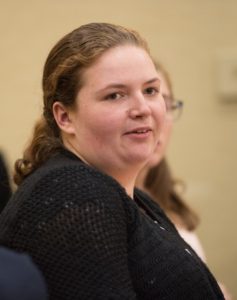Alexa Stathis, a Ph.D. student in Chemistry, is in the EMPOWER “spotlight” this month. Thanks for contributing, Alexa!

Alexa, what inspired you to become a scientist?
I come from a family of mostly scientists and engineers. My dad is an aerospace engineer and my older brother is a robotics engineer. Many members of my extended family are also scientists or engineers. I knew from a fairly young age that I wanted to go into STEM. When I started taking chemistry classes in high school I felt like it was something that just came naturally to me when many of peers struggled with it. This led me to decide to major in chemistry in college. During my junior year of college, I went on a service trip that focused on sustainability and environmental issues which inspired me to learn more about environmental chemistry.
What skills and knowledge have been of key importance to your success in graduate school?
The most important skill you should learn in college is how to teach yourself. Everyone learns differently, and figuring out how you learn best can be hard but is incredibly important.
My undergraduate program required juniors and seniors to take a seminar class, where each semester the students would present a paper from a chemistry journal to the entire department. Even though I thought it was miserable at the time, I learned so many important things from this class: how to read scientific papers, how to craft presentations and communicate scientific information, and how to field questions. All of these things have helped me immensely in graduate school.
Do you have any mentors who have helped guide you?
I would not be in graduate school if it was not for two of my undergraduate professors, Deno Del Sesto and Leon Tilley. They encouraged me to apply to graduate school even though I had little confidence that I could get in, never mind get a PhD. The EMPOWER program manager, Deanna, has been someone I can vent to and has given me a lot of valuable advice about navigating not just the EMPOWER program but graduate school itself. Finally, my advisor, Tara, has supported me since the very beginning.
What advice would you give new graduate students?
- Don’t underestimate the importance of picking which lab to work in. Talk to the PI’s students and other students in the department. Think about whether it will teach you the skills needed for the career you want. Make sure the everyday work is something you wouldn’t mind doing for the next 4-6 years.
- Do SOMETHING outside of work. Have a hobby. It will help keep you sane.
- Take care of yourself- your physical, mental and emotional well-being comes first.
About Alexa:
Alexa graduated from Stonehill College with a B.S in Chemistry and a minor in Physics in May 2014. For her undergraduate research, she characterized thiol and thioether self-assembled monolayers on gold and graphene films using Scanning Tunneling Microscopy. Alexa came to Syracuse University as a chemistry PhD student in the Fall of 2014 when she joined Dr. Tara Kahan’s lab. Her research involves investigating the fate of pollutants in natural waters, snow and ice. She uses a variety of techniques to measure how fast certain pollutants break down in sunlight and what products they form when in water and on ice surfaces. In Spring 2016, she passed her candidacy exam. Alexa has been awarded the Syracuse University Water Fellowship and the EMPOWER NRT fellowship.